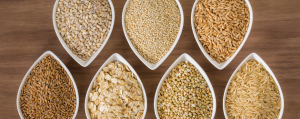7 Heart-Healthy Foods
Posted: 03/02/2020

Heart disease accounts for nearly one third of all deaths worldwide. Diet plays a major role in heart health and can impact your risk of heart disease. This National Heart Month, let’s take a look at 7 foods that can help keep your heart healthy!

Leafy green vegetables
Leafy green vegetables are well-known for their wealth of vitamins, minerals and antioxidants. They are a great source of Vitamin K, which helps to protect your arteries and promote proper blood clotting. They are also high in dietary nitrates which can help to reduce blood pressure, decrease arterial stiffness and improve the function of cells lining the blood vessels. Some of the best leafy greens include spinach, kale and cabbage.

Garlic
Garlic has been used throughout history as a natural remedy to treat a variety of ailments. It can improve heart health thanks to the presence of allicin, a compound believed to have a multitude of therapeutic effects. Other benefits of garlic include helping reduce blood pressure and lower high levels of cholesterol.

Berries
Berries are jam-packed with important nutrients that play a central role in heart health. They are rich in antioxidants which protect against the oxidative stress and inflammation that contributes to the development of heart disease. Some of the best berries include strawberries, raspberries and blueberries.

Avocados
Avocados are an excellent source of heart-healthy monosaturated fats which have been linked to reduced levels of cholesterol and a lower risk of heart disease. High levels of potassium, make it essential to heart health, and can decrease blood pressure, which in turn can lower the risk of having a stroke.

Whole Grains
Whole grains include all three nutrient-rich parts of the grain; germ, endosperm and bran.They are high in fiber, which can help to lower cholesterol and decrease the risk of heart disease. Whole grains include whole-wheat flour, bulgur wheat, oatmeal and brown rice.

Fatty Fish
Fatty fish like salmon, mackerel and tuna, are loaded with omega-3 fatty acids which have been studied extensively for their heart-health benefits. Eating these fish long term has been shown to lower levels of total cholesterol, blood triglycerides, fasting blood sugar and systolic blood pressure. This makes fatty fish one of the best things you can eat for a healthier heart.

Tomatoes
Tomatoes are loaded with lycopene, a natural plant pigment with powerful oxidant properties. Antioxidants help neutralise harmful free radicals, preventing oxidative damage and inflammation, both of which can contribute to heart disease. Low blood levels of lycopene are linked to an increased risk of heart attack and stroke.

To Summarise….
Studies are increasingly showing a stronger link between diet and heart disease. Exercise can contribute to a healthy heart, though what you put on your plate can influence just about every aspect of heart health. From blood pressure and inflammation to cholesterol levels and triglycerides, what you eat affects your heart. Including some or all of these foods as part of a well-balanced and nutritious diet can help keep your heart in good shape and minimise your risk of heart disease.



